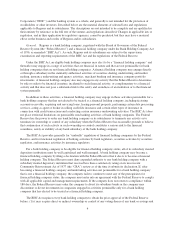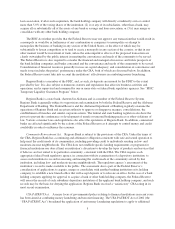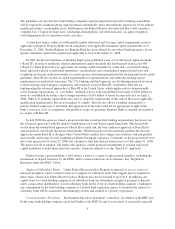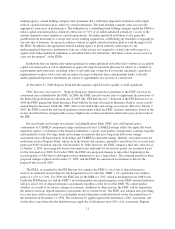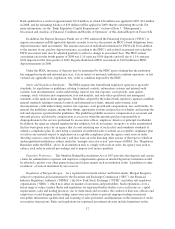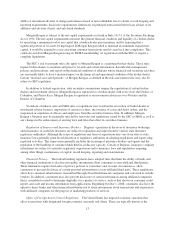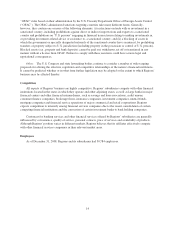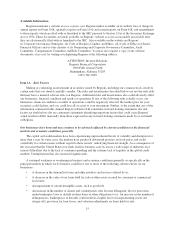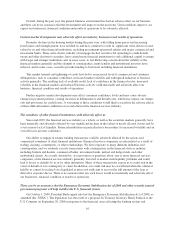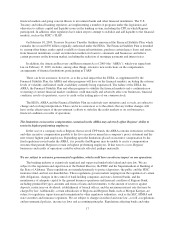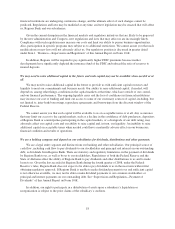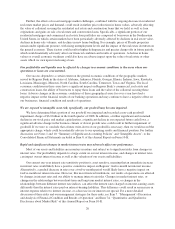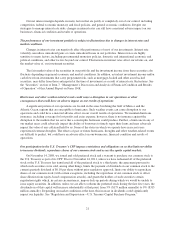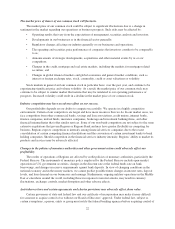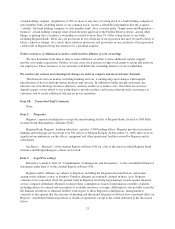Regions Bank 2008 Annual Report Download - page 23
Download and view the complete annual report
Please find page 23 of the 2008 Regions Bank annual report below. You can navigate through the pages in the report by either clicking on the pages listed below, or by using the keyword search tool below to find specific information within the annual report.ability of investment advisers to charge performance-based or non-refundable fees to clients, record-keeping and
reporting requirements, disclosure requirements, limitations on principal transactions between an adviser or its
affiliates and advisory clients, and anti-fraud standards.
Morgan Keegan is subject to the net capital requirements set forth in Rule 15c3-1 of the Securities Exchange
Act of 1934. The net capital requirements measure the general financial condition and liquidity of a broker-dealer
by specifying a minimum level of net capital that a broker-dealer must maintain, and by requiring that a
significant portion of its assets be kept liquid. If Morgan Keegan failed to maintain its minimum required net
capital, it would be required to cease executing customer transactions until it came back into compliance. This
could also result in Morgan Keegan losing its FINRA membership, its registration with the SEC or require a
complete liquidation.
The SEC’s risk assessment rules also apply to Morgan Keegan as a registered broker-dealer. These rules
require broker-dealers to maintain and preserve records and certain information, describe risk management
policies and procedures, and report on the financial condition of affiliates whose financial and securities activities
are reasonably likely to have a material impact on the financial and operational condition of the broker-dealer.
Certain “material associated persons” of Morgan Keegan, as defined in the risk assessment rules, may also be
subject to SEC regulation.
In addition to federal registration, state securities commissions require the registration of certain broker-
dealers and investment advisers. Morgan Keegan is registered as a broker-dealer with every state, the District of
Columbia, and Puerto Rico. Morgan Keegan is registered as an investment adviser in over 40 states and the
District of Columbia.
Violations of federal, state and SRO rules or regulations may result in the revocation of broker-dealer or
investment adviser licenses, imposition of censures or fines, the issuance of cease and desist orders, and the
suspension or expulsion of officers and employees from the securities business firm. In addition, Morgan
Keegan’s business may be materially affected by new rules and regulations issued by the SEC or SROs as well as
any changes in the enforcement of existing laws and rules that affect its securities business.
Regulation of Insurers and Insurance Brokers. Regions’ operations in the areas of insurance brokerage
and reinsurance of credit life insurance are subject to regulation and supervision by various state insurance
regulatory authorities. Although the scope of regulation and form of supervision may vary from state to state,
insurance laws generally grant broad discretion to regulatory authorities in adopting regulations and supervising
regulated activities. This supervision generally includes the licensing of insurance brokers and agents and the
regulation of the handling of customer funds held in a fiduciary capacity. Certain of Regions’ insurance company
subsidiaries are subject to extensive regulatory supervision and to insurance laws and regulations requiring,
among other things, maintenance of capital, record keeping, reporting and examinations.
Financial Privacy. The federal banking regulators have adopted rules that limit the ability of banks and
other financial institutions to disclose non-public information about consumers to non-affiliated third parties.
These limitations require disclosure of privacy policies to consumers and, in some circumstances, allow
consumers to prevent disclosure of certain personal information to a non-affiliated third party. These regulations
affect how consumer information is transmitted through diversified financial companies and conveyed to outside
vendors. In addition, consumers may also prevent disclosure of certain information among affiliated companies
that is assembled or used to determine eligibility for a product or service, such as that shown on consumer credit
reports and asset and income information from applications. Beginning October 1, 2008, consumers also have the
option to direct banks and other financial institutions not to share information about transactions and experiences
with affiliated companies for the purpose of marketing products or services.
Office of Foreign Assets Control Regulation. The United States has imposed economic sanctions that
affect transactions with designated foreign countries, nationals and others. These are typically known as the
13



